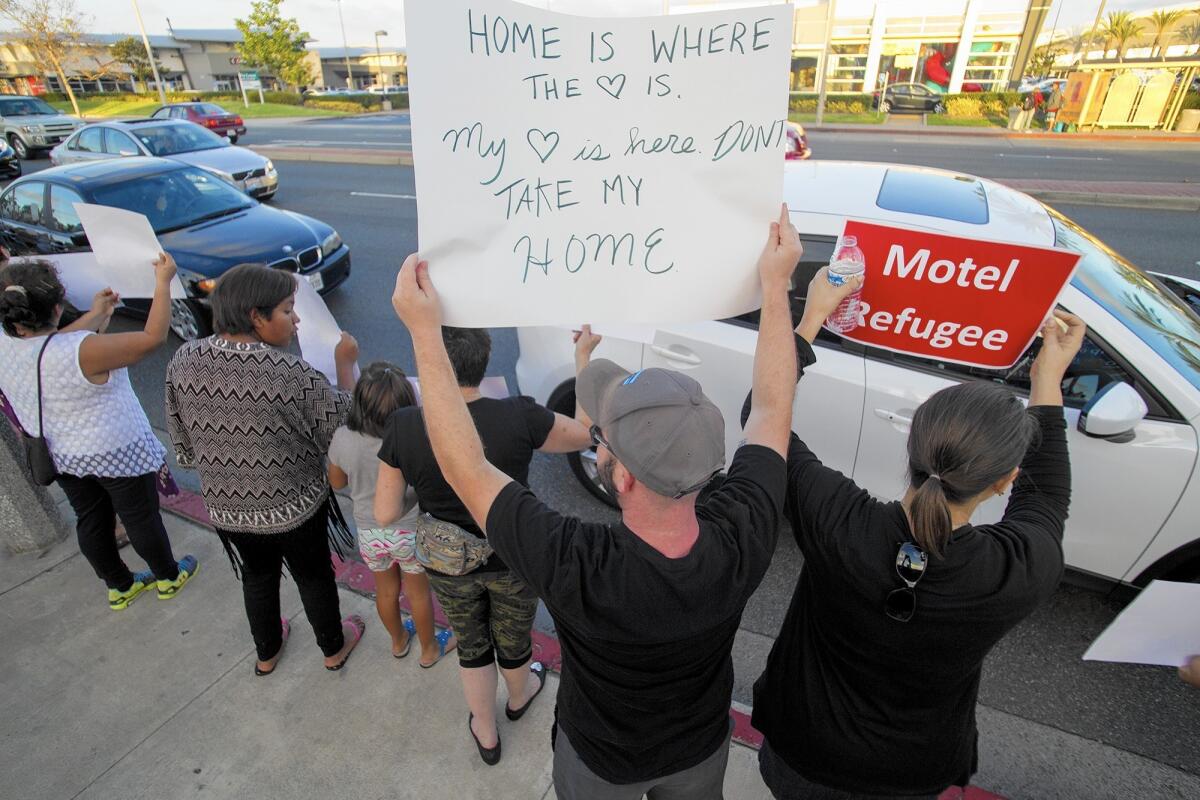Will Costa Mesa voters tax themselves to pay for affordable housing? $20M bond will be on the November ballot

After regularly hearing calls for more affordable housing in Costa Mesa, Mayor Pro Tem Jim Righeimer says it’s time for residents to put up money for it.
They’ll have a chance to do so this year. The Costa Mesa City Council voted 3-0 on Tuesday to place a $20-million bond for affordable-housing projects on the Nov. 8 election ballot. Council members Katrina Foley and Sandy Genis were absent.
“I am ‘Mr. No on Taxes,’ ” Righeimer said. “But if we want affordable housing, we’ve got to be adults and someone has to pay for it.”
Should residents reject the bond proposal, Righeimer said, they should stop complaining about a lack of low-income units in town.
“It’s going to take a two-thirds vote, folks. But if at least 50% don’t vote for it, don’t ever come back to these microphones again and say you want affordable housing if you weren’t out there at least fighting for it or pushing for it or campaigning for it,” Righeimer said. “Because you’re full of hot air; it means nothing.”
The bond measure hasn’t yet been written, but it would include a new tax of an undetermined amount.
The handful of residents who spoke Tuesday said there is a need for more local affordable housing, but they also made it clear they don’t think their tax bills ought to rise to make it happen.
Resident Tamar Goldmann said the $20 million is a “figure pulled out of a hat” and called the proposal a “cruel joke.”
“No plans, no land, just hand over $20 million,” she said.
In an interview Wednesday, Kathy Esfahani of the Costa Mesa Affordable Housing Coalition said it “would be terrific if the city had funds to build affordable housing, and the bond measure is a great way to do it.”
She suggested the city also look at requiring developers to either create low-income units as part of their projects or pay fees that could be used for such housing elsewhere.
“We look forward to learning the details,” Esfahani said of the bond measure. “But preliminarily, we’d be all behind it.”
Though it’s hard to say exactly how many additional low-income units Costa Mesa needs, the number is almost certainly in the hundreds, Esfahani said.
By contrast, a state-mandated document called the Housing Element, which addresses citywide housing needs from 2013 to 2021, says Costa Mesa needs only two more low-income housing units.
Righeimer said the goal of the bond proposal is to leverage the bond money to get additional dollars from the state or federal government.
That’s vital when considering that building 60 to 70 units of affordable housing can cost $18 million to $25 million, said Cesar Covarrubias, executive director of the Kennedy Commission, an affordable-housing advocacy group based in Irvine. The group filed a lawsuit this year alleging that a city-approved plan to demolish the Costa Mesa Motor Inn on Harbor Boulevard and replace it with 224 high-end apartments violates state law because it didn’t set aside any low-income units.
Mayor Steve Mensinger said the cost of affordable housing shouldn’t be borne by developers alone.
“If the community wants affordable housing, we can all pay for it,” he said.
Affordable housing in Costa Mesa, or the lack thereof, has been a much-discussed topic of late.
Last week, representatives of the Affordable Housing Coalition urged the Planning Commission to incorporate new low-cost units into a proposed incentive program aimed at enticing motel owners along Harbor and Newport boulevards to redevelop their properties into housing projects.
City officials say doing so could help get rid of some “problem” motels — such as the Costa Mesa Motor Inn, Sandpiper Motel and Vagabond Inn — that have long been characterized as blighted and hotbeds for drug use and crime.
Opponents, though, worry that getting rid of the motels would take away de facto affordable housing.
